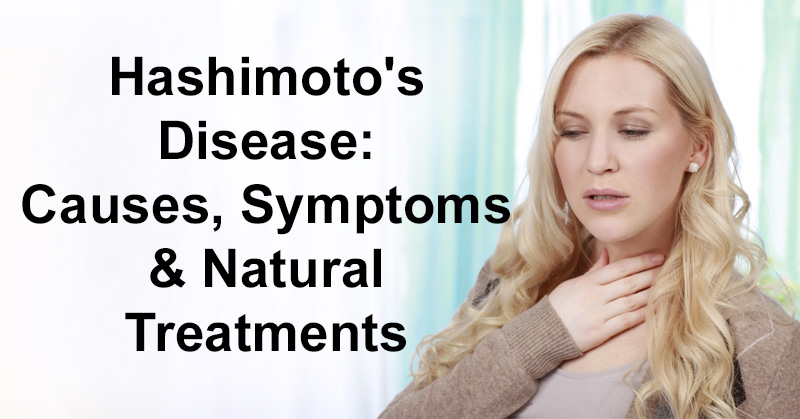Hashimoto’s disease is an autoimmune disorder that causes the immune system to attack the body’s healthy tissue, causing symptom such as fatigue, weight gain and digestive issues. About 90% of hypothyroidism cases are due to Hashimoto’s disease. Known as Hashimoto’s thyroiditis, the condition causes chronic inflammation in the thyroid gland. (1) The autoimmune disorder can be caused by a number of environmental and genetic factors. Natural Hashimoto’s treatment focuses on maintaining a healthy lifestyle and following a Hashimoto’s diet to help keep symptoms at bay.
Hashimoto’s Causes
- Genetics
- A poor diet
- Hormonal imbalance
- Autoimmune disease reactions
- Leaky gut syndrome and problems with digestive function
- Common allergen and inflammatory foods such as gluten and dairy
- Widely-consumed foods that cause sensitivities and intolerances such as grains and food additives
- Emotional stress (2)
- Nutrient deficiencies

Hashimoto’s Symptoms
- Fatigue
- Depression and anxiety
- Weight gain
- Infertility
- Feeling cold easily
- Digestive issues
- Muscle aches and tenderness
- A swollen face, eyes and stomach
- Stiffness and swelling in the joints
- Hair loss, hair thinning
- Rough, cracked skin
- Trouble breathing
- Frequent urination and excessive thirst
- Low sex drive or sexual dysfunctions
- Changes in menstrual cycle including absent or irregular periods
- Frequent colds, infections and illnesses due to low immune function
Hashimoto’s Treatment
1. Remove Problem Foods From Your Diet
Following a Hashimoto’s diet means removing problem foods from your diet that can trigger autoimmune reactions. (3) For Hashimoto’s treatment, eliminate:
- Gluten: Eliminating gluten may be helpful for Hashimoto’s thyroiditis natural treatment. Gluten can trigger an unwanted autoimmune reaction.
- Grains: Grains can contribute to inflammation in the body, contributing to digestive problems and Hashimoto’s symptoms.
- Dairy: Dairy products that are pasteurized can be hard to digest and may contribute to Hashimoto’s symptoms.
- Sugar: Foods and drinks that are full of sugar should be cut out of a Hashimoto’s diet. Processed sugar causes inflammation and can contribute to weight gain, blood sugar fluctuations and other health problems.

2. Consume Gut-Healing Foods
Gut-healing foods are an important part of Hashimoto’s treatment. To start the healing process from the inside out, add the following foods to your diet:
- Fresh fruits and vegetables: Fruits and vegetables are high in antioxidants, which help fight inflammation. They’re also high in fiber, which helps with digestive health and blood sugar levels.
- Coconut Oil: Coconut oil is made up of medium-chain fatty acids that help support a healthy metabolism, increase energy levels and fight fatigue.
- Probiotics: Probiotic foods promote the growth of healthy bacteria in the gut to support healing. (4)
- Sprouted seeds and beans: Flax seeds, hemp seeds and chia seeds contain an omega-3 fat called ALA, which helps balance hormones.
3. Try Supplements
Certain supplements can work as Hashimoto’s thyroiditis natural treatment methods. Supplements that help heal and repair the thyroid include:
- Selenium: Selenium helps regulate hormones in the body. Studies have shown that a selenium deficiency increases the risk for thyroid disorders. (5)
- Vitamin D: Vitamin D helps promote a healthy immune system. Spend time outdoors each day or supplement with 600-5,000 IU each day.
- Adaptogen Herbs: Adaptogen herbs help reduce thyroid and adrenal issues by boosting the body’s ability to handle stress and balance hormones. Try ashwagandha, rhodiola, ginseng, maca, and reishi mushroom.
- B Vitamins: B Vitamins play a key role in energy maintenance. Studies have shown that 600 milligrams per day can help reduce fatigue in patients with Hashimoto’s. (6)

4. Improve the Body’s Ability to Detox
Detoxing on a regular basis helps the body flush out harmful toxins to lower inflammation levels. To reduce your exposure to chemicals and help your body detox:
- Consider a natural approach to contraceptives instead of birth control pills.
- Consider removing any silver fillings in your mouth.
- Pay close attention to the ingredients in the personal care products you use.
- Store food in glass and ceramic containers instead of plastic or aluminum.
- Avoid smoking, using recreational drugs and drinking alcohol in excess.
5. Manage Stress Levels
Managing your stress levels is an important part of Hashimoto’s treatment. Studies have shown that up to 80% of patients with autoimmune symptoms report emotional stress before the onset of symptoms. (7) Stress can easily trigger an autoimmune response in the body. Manage stress levels by participating in relaxing or stress-relieving activities on a regular basis.


